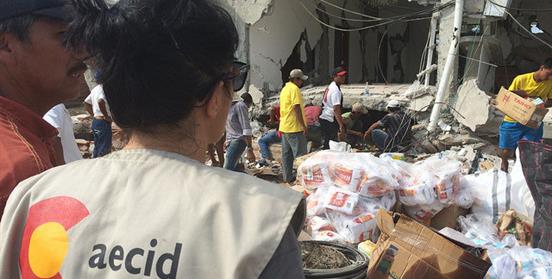The Diplomat
Between January and July of this year, Spain managed a total of eleven emergency aid operations worth more than six million euros, mostly destined for “vulnerable populations in countries without resources”, according to data provided by the Office of Humanitarian Action (OAH) of the Spanish Agency for International Development Cooperation (AECID).
In a statement released on the occasion of World Humanitarian Day, celebrated on Thursday, the AECID points out that the operations were aimed at populations without sufficient resources to “treat extreme patients”, and that they also do not have “the means to establish basic disease prevention measures”.
Many of these operations were carried out to alleviate the effects of COVID-19, specifically, on two occasions in Lebanon and on two others in Bolivia, as well as in Brazil, India, Nepal, Guatemala, Paraguay and Tunisia.
In other cases, despite being crises caused by nature -such as the eruption of the Nyaragongo volcano in the Democratic Republic of Congo– or by man -such as the conflict in northern Mozambique– the actions also included the COVID-19 component.
AECID explains that the action that led to the largest operation in a crisis caused by unnatural causes was the explosion of a military arsenal in Bata (Equatorial Guinea), in which a hundred people died and many others were injured. Spain, at the request of the Equatorial Guinean authorities, deployed 14 medical personnel from START, the Spanish Emergency Medical Team, to the area. The team also supported Equatoguinean health personnel in caring for the injured “and contributed to the rehabilitation of the affected health facilities”.
In terms of funds for emergency operations, AECID points out that in 2020 the funds earmarked for humanitarian action were increased to almost 75 million euros (€74.96 million), with which the Agency carried out 17 direct emergency operations last year.
In addition, in 2020 there were also humanitarian responses “focused exclusively on covering needs in the health sector due to the COVID-19 pandemic”, according to the statement, in the cases of Venezuela, Peru, Ecuador, Costa Rica and other sudden-onset disasters.
Among these operations, the Humanitarian Action Office (OAH) points out that in addition to working with emergency operations, it also carries out “planned actions in contexts defined as priorities for Spanish Humanitarian Aid”, such as the Sahrawi refugee camps, the humanitarian context in Latin America and the Caribbean, the regional crisis in Syria, Palestine, and the context of the Sahel and Lake Chad, among others.
In the communiqué, the Humanitarian Action Office highlights the collaboration with the Ministry of Health, which it says “has provided AECID operations with strategic materials to speed up and improve the quality of the aid provided”.
It also points out that the operations were carried out both through direct bilateral relations, with the activation of emergency agreements with Spanish NGOs, and by contributing to international humanitarian aid organisations that “evaluate and estimate the costs of the emergency and make international appeals for aid adapted to alleviate the effects of a given crisis on the population.
Finally, the AECID refers to “humanitarian diplomacy”, emphasising “the humanitarian principles of humanity, impartiality, neutrality and independence” that “govern the work of this Office”, and referring, at present, to the management of Spanish humanitarian aid sent to Haiti “to alleviate, in the most affected and vulnerable population, the effects of the earthquake that occurred on 14 August”.







